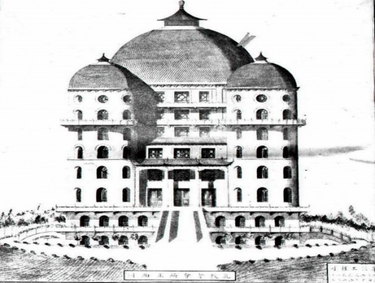Confucian church

The Confucian church (Chinese: 孔教会; pinyin: Kǒng jiàohuì or pinyin: Rú jiàohuì) is a Confucian religious and social institution of the congregational type. It was first proposed by Kang Youwei (1858-1927) near the end of the 19th century, as a state religion of Qing China following a European model.[2]
The “Confucian church” model was later replicated by overseas Chinese communities,[3] who established independent Confucian churches active at the local level, especially in Indonesia and the United States.
There has been a revival of Confucianism in contemporary China since around 2000, which has triggered the proliferation of Confucian academies (Chinese: 书院; pinyin: shūyuàn); the opening and reopening of temples of Confucius; the new phenomenon of grassroots Confucian communities or congregations (Chinese: 社区儒学; pinyin: shèqū rúxué); and renewed talks about a national “Confucian church”.[4] With the participation of many Confucian leaders, a national Holy Confucian Church (Chinese: 孔圣会; pinyin: Kǒngshènghuì) was established on November 1, 2015; its current spiritual leader is Jiang Qing.
The idea of a “Confucian Church” as the state religion of China was proposed in detail by Kang Youwei as part of an early New Confucian effort to revive the social relevance of Confucianism. The idea was proposed at a time when Confucianism was not institutionalized, after the collapse of the Qing dynasty and the Chinese empire.[3] Kang modeled his ideal “Confucian Church” after European national Christian churches—hierarchical and centralised institutions closely bound to the state, with local church branches, Sunday prayers and choirs, missions, journals, and even baptisms, devoted to the worship and the spread of the teachings of Confucius.[3][5]
The large community of Confucian literati—who were left without an organization or an outlet for their rituals, values, and identity after the dissolution of state Confucianism, supported such projects.[5] Similar models were also adopted by various newly created Confucian folk religious sects, such as the Xixinshe, the Daode Xueshe, and the Wanguo Daodehui.[5]
The Confucian Church was founded in 1912 by a disciple of Kang, Chen Huanzhang, and within a few years it established 132 branches in China.[6] From 1913 to 1916, an important debate took place about whether Confucianism should become the state religion (guo jiao) and thus be inscribed in the constitution of China.[6] This did not occur and anti-religious campaigns in the 1920s led to a full dissolution of the Confucian church.[6]
While Kang’s idea was not realized in China, it was carried forward in Hong Kong and among overseas Chinese people.[3] The Hong Kong branch of Kang’s movement became known as the “Confucian Academy” (孔教学院), while the Indonesian branch became the Supreme Council for the Confucian Religion in Indonesia. Members believe in Tian, with Confucius as the prophet (Indonesian: nabi).[7] Chinese people in the United States established independent, local Confucian churches such as the Confucius Church of Sacramento or the Confucius Church of Salinas.
In contemporary China, the Confucian revival of the 21st century has developed a variety of interrelated ways: the proliferation of Confucian academies,[7] the resurgence of Confucian rites,[7] and the birth of new forms of Confucian activity on the local level, such as Confucian communities. Some scholars consider the reconstruction of Chinese lineage associations and their ancestral shrines, as well as cults and temples worshiping natural and national gods from other Chinese traditional religions, as part of the revival of Confucianism.[8]
Other groups associated with the revival include folk religions[9] or salvationist religions[10] that have a Confucian focus. Confucian churches, for example the Yidan xuetang (一耽学堂) in Beijing,[11] the Mengmutang (孟母堂) of Shanghai,[12] the Way of the Gods according to the Confucian Tradition, Phoenix Churches,[13] and the Confucian Fellowship (儒教道坛; Rújiào Dàotán) in northern Fujian have spread rapidly over the years since their foundation.[13] Ancestral shrines of the Kong family have also reopened, as well as Confucian-teaching churches.[12]
